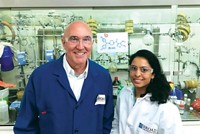Advertisement
Grab your lab coat. Let's get started
Welcome!
Welcome!
Create an account below to get 6 C&EN articles per month, receive newsletters and more - all free.
It seems this is your first time logging in online. Please enter the following information to continue.
As an ACS member you automatically get access to this site. All we need is few more details to create your reading experience.
Not you? Sign in with a different account.
Not you? Sign in with a different account.
ERROR 1
ERROR 1
ERROR 2
ERROR 2
ERROR 2
ERROR 2
ERROR 2
Password and Confirm password must match.
If you have an ACS member number, please enter it here so we can link this account to your membership. (optional)
ERROR 2
ACS values your privacy. By submitting your information, you are gaining access to C&EN and subscribing to our weekly newsletter. We use the information you provide to make your reading experience better, and we will never sell your data to third party members.
Start-ups
Terray seeks to combine nanotechnology, AI
Start-up raises $60 million for platform that does drug discovery on microarrays
by Jared Whitlock, special to C&EN
February 15, 2022
Terray Therapeutics has emerged with $60 million in series A funding and a mission to turbocharge drug discovery using artificial intelligence and nanotechnology.

Founded in 2018, Terray is developing what it calls its tNova platform, which pairs machine learning, among other software, with postage stamp–sized microarrays. CEO Jacob Berlin says the combination allows Terray to map chemical interactions between small molecules and drug targets at an unmet scale, speed, and level of precision.

Terray’s website says its approach to drug discovery starts by using DNA barcoding and solid-phase synthesis to build combinatorial libraries on nanoparticle beads, which are immobilized in reusable chips the size of a stamp. DNA is sequenced in position, changing chemical barcoding to spatial barcoding, the firm says. The DNA tag is then cleaved, leaving a DNA-free chip with 32 million compounds.
The molecule-packed chips are then exposed to a target of interest, and the binding affinity between compound and target is measured by fluorescence.
“We’re measuring each molecule specifically by itself and precisely, and that technology doesn’t exist anywhere else,” Berlin says. He notes that the company makes billions of chemical measurements each day, and the process continues to improve. “It’s that back-and-forth iteration that allows us to drive the answers that others don’t find.”
Artificial intelligence alone cannot accomplish this feat, Berlin argues. “Drug discovery isn’t just an algorithm problem; it’s a data problem,” he says.
Terray spun out of City of Hope, a California hospital and cancer-research center where Berlin ran a nanotechnology-centered lab. His experiences with patients fueled his desire to form Terray. “People who aren’t at health-care facilities and don’t interact with patients frequently don’t fully appreciate just the magnitude of unmet medical need that’s out there,” Berlin says.
Berlin was also inspired by Robert Grubbs, a Nobel laureate whom he studied under at California Institute of Technology. Grubbs, who died last year, translated chemistry breakthroughs into new products, including pharmaceuticals and specialized plastics. “He’s always been a voice in my life around translating our work, making sure we would think about what’s important to people, and then getting it done with an excellent team,” Berlin says.
The Pasadena, California–based company has 50 employees and plans to add another 30 by year end. Another goal is to file an investigational new drug application—a formal request to start a clinical trial—within 18 months.
Terray will initially focus on immunology, but Berlin says the company’s platform presents “unlimited opportunity.”
“It’s agnostic to target or indication. You can screen incredibly diverse collections of small molecules; you can put incredibly different classes of targets across it,” Berlin says. The company has also inked partnerships to help undisclosed companies find drug compounds.
Berlin founded the company with his brother Eli, who says he joined Terray after witnessing Jacob’s excitement over the technology. Eli, who is Terray’s chief financial officer and chief operating officer, says the current weakness in biotech stocks didn’t affect the company’s ability to raise money. “There’s a large and growing investor base excited about the promise of platform technologies,” he says.
The financing was led by Madrona Venture Group, with participation from Two Sigma Ventures, Digitalis Ventures, KdT Ventures, Goldcrest Capital, XTX Ventures, Sahsen Ventures, Greentrail Capital and Alexandria Venture Investments. The series A round follows a previously unannounced $20 million seed round in March 2019.
CORRECTION
This story was updated on Feb. 15, 2022, to correct the name in the byline. It is Jared Whitlock, not Jarod Whitlock.



Join the conversation
Contact the reporter
Submit a Letter to the Editor for publication
Engage with us on Twitter